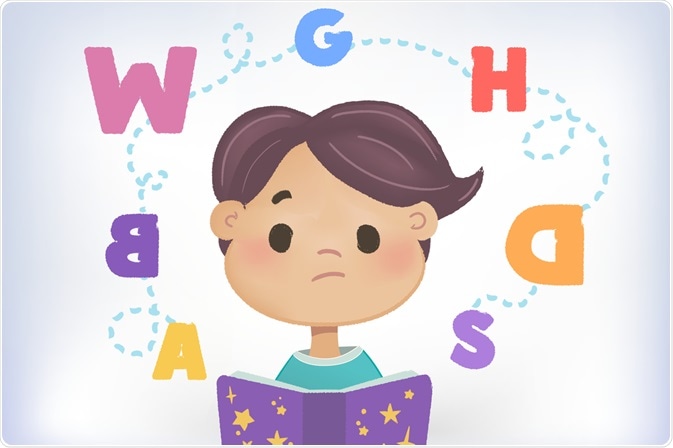Dyslexia is the general term used to describe a common learning disorder in which the affected individual's reading ability is impaired due to difficulty recognizing the sounds made in speech and how those sounds relate to letters and words. The condition is also referred to as a specific reading disability.

Image Credit: art_inside / Shutterstock.com
Dyslexia in children
Children affected by dyslexia find it difficult to identify root words, which makes it difficult for them to determine the order in which letters should follow each other in words. Children with dyslexia may have normal vision and intellectual ability, meaning that the condition can often go unnoticed and undiagnosed well into adolescence and even adulthood.
Most children who have dyslexia can go on to perform well at school if they are provided with emotional support, tutoring, and educational programs that are tailored to their specific needs. A diagnosis of dyslexia is based on intellectual, psychological, educational, medical, speech, and language assessments. This condition is managed through educational programs that teach strategies for word recognition.
Experts now believe that aural, as opposed to visual problems, are the main factors at play in reading disabilities. The ability to discriminate, blend, memorize and analyze sounds is impaired, which can affect the understanding and production of the written word.
Genetic predisposition
The exact cause of dyslexia is not clear, although the condition is generally thought to run in families. To this end, dyslexia appears to be an inherited condition, and children with a family history of learning reading disabilities are more likely to develop dyslexia than children without such a family history.
Other factors have also been identified that may contribute to the severity of the condition.
For example, six different genes have been identified as potentially increasing an individual's risk of dyslexia. Four of these genes are thought to be involved in an early stage of the brain formation process called neuronal migration, which leads to the development of specialized brain areas.
Most experts agree that dyslexia is associated with dysfunctions in left-hemisphere brain areas that are involved in language comprehension, which includes the Wernicke motor speech area, and sound/speech production, which is the Broca motor speech area.
Acquired dyslexia
In a minority of cases, dyslexia develops after birth, most commonly as a result of stroke, brain injury, or some other form of brain trauma.
What Causes Dyslexia?
Phonological processing
Phonological processing refers to the ability to understand how words are made up of smaller units of sounds or “phonemes.”
As infants, people have a natural ability to recognize words, which helps them to acquire language. However, these words are often recognized as one sound rather than broken down into component sounds. For example, the word “refrigerator” will become recognized as having a certain sound and does not need to be broken down into the components “re,” “fri,” “ger,” and "ator" in order for the child to understand it. This is not the case, however, when a child is learning to read or write.
The development of reading and writing skills depends on the phonological processing, which is defined as a child’s ability to identify letters, assemble them into phonemes and use those phonemes to make up or interpret a word. Brain scans suggest that the cause of dyslexia is rooted in a diminished ability to process words in this way due to alterations in the development and function of certain parts of the brain.
Treatment options
There is no cure for dyslexia. Some of the different interventions that are available to help people with dyslexia are designed to improve how they cope with the condition, as well as provide ways in which they can enhance their reading and writing skills. The earlier a child is diagnosed with dyslexia, the sooner they can receive support and the more likely they are to eventually see an improvement.
A teacher trained in teaching dyslexic children uses a range of strategies to help the child enhance their reading ability. The techniques usually involve helping the child to tap into their sense of touch, hearing and vision. For example, some children find that using their finger to trace the shape of a letter enables them to process data in a more effective way.
A dyslexic child is helped to improve the following:
- Recognition and understanding of phenomes
- Reading aloud
- Reading comprehension
- Building vocabulary
Psychologists and teachers also emphasize how important it is to ensure that the child maintains good self-esteem and self-image. It is also important to remind the child that although reading and writing may be problematic, dyslexia is a condition that affects millions of people across the globe who have still managed to achieve their goals in life.
References
Further Reading
Last Updated: Jan 18, 2023